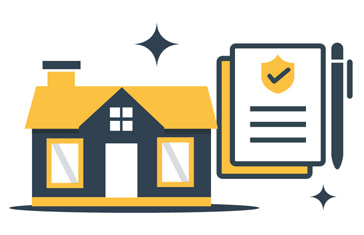Real Estate Agent Fees - What to Pay & How to Negotiate
Our guide outlines what fees you'll pay, The pros and cons of using a real estate agent, industry insights, frequently asked questions and tips to prevent unnecessary real estate expenses.
Updated 23 January 2024
Summary:
Our guide covers:
Summary:
- Despite the costs and some distrust of the industry, the most popular way to buy and sell houses in New Zealand is through real estate agents. However, in a world where selling a house appears to be easier than ever before, some homeowners in the market are questioning the utility of using real estate agents.
- With a wide variety of alternatives such as realestate.co.nz, TradeMe, homes.co.nz and other marketplace platforms, real estate agents are experiencing increasing competition from technology offerings that are more streamlined, less costly and can access a wider number of people.
- However, real estate agents provide unique characteristics and are still the first choice for people looking to sell their homes.
- Some New Zealanders are hiring real estate agents to sell their homes for the convenience of it. However, it does not come cheap - the average cost to hire a real estate agent can sit anywhere from 1% to 5% of the total purchase price. (i.e. $10,000 to 50,000 assuming the average house price in Auckland or Wellington of $1m).
- Our guide analyses the real estate agent service, what they do and how they get paid and why homeowners would consider selling their house through real estate agents. Our frequently asked questions section expands more on real estate agents and their fees.
Our guide covers:
Know This First - Are real estate commission fees negotiable? MoneyHub Founder Christopher Walsh shares his views:
|
"Many MoneyHub users ask us this question. And the good is is that all of the following are negotiable when selling a home:
But, how much you can negotiate depends on your home and the agent. Also, it is important to base your decision on who to list with in all factors, rather than purely on the basis of a commission fee. A poorly organised real estate agent can cost more in the overall sale price than the commission paid. Although their percentage of the commission may vary, real estate commissions and fees are the same whether you choose a professional agent with extensive real estate expertise or a freshly qualified, inexperienced real estate agent. Top tier real estate agents (e.g. Ray White, Bayleys) command a premium for their brand and networks, and may still not end up fetching a higher price than some of the other agents (or property transactions). It's important to test out the market and try to negotiate with the agents. They want your business (especially if your property is standard and they're able to sell it quickly), so use this to your advantage. Skilled real estate agents can typically negotiate the best sale prices with buyers in a variety of situations, including some that are not always straightforward". |
MoneyHub Founder
Christopher Walsh |
When is the best time to negotiate on fees and commission?
Negotiating real estate commissions is a difficult task. The ideal moment to talk about it with an agent is after they've presented you with the comparative market valuation appraisal, so you know exactly what you'll get for the commission they'll charge you. They are less offended at this point because they have already invested time in the property appraisal process for you.
Know This: Some real estate brokers lack the power to negotiate real estate commissions with vendors, while others flatly refuse to do so.
Know This: Some real estate brokers lack the power to negotiate real estate commissions with vendors, while others flatly refuse to do so.
Why should I go through a real estate agent?
Real estate agents support homeowners to buy and sell houses. The mains reason people hire real estate agents include:
- Outsource the time and effort it takes to sell a house to a third party.
- Attempt to get a better price for the property (with the assumption that a real estate agent has a wider network and can increase the number of prospective buyers, therefore increasing the number of offers and ultimately the final sales price)
- Speed up the house selling process from a few months to a few weeks
How do real estate agents make money?
Real estate agents typically make money by following a commission formula. On a sale of smaller properties (e.g. $500,000), the success fee percentage is usually between 2.5% and 4% going to the wider real estate firm (e.g. Ray White or Bayleys), with 2% to 2.5% percent on this amount paid to the real estate agent who closed the deal. The fees will be slightly lower for larger properties listing for more than $1m.
What other costs are associated with going through a real estate agent?
Aside from commission fees (around 4%), there will likely be advertising fees, which vary greatly. Other costs include getting LIM reports, property revaluations and drafting legal contracts. Some agents will include these services in the total commission fee, whilst others will charge extra for each additional service they provide.
Important: What is a reasonable amount of real estate commission to pay?
The costs of selling a house have not increased at the same rate as house prices (e.g. the percentage charged from real estate agents have stayed approximately the same – around 3 - 4%). However, real estate agents charge a percentage fee on the costs of a property transaction. As property prices increase, (e.g. Auckland's average asking price has risen from 800,000 to $1m), the absolute fee amount that real estate agents get increases.
For example, if a real estate agent took 4% on an $800,000 sale from a house in Auckland, they would generate $32,000 in fees. If the real estate agent took 4% on a $1m sale from a house in Auckland, they would generate $40,000. The percentage fee has not changed, but the transaction has generated an extra $8,000 in revenue for the firm.
For example, if a real estate agent took 4% on an $800,000 sale from a house in Auckland, they would generate $32,000 in fees. If the real estate agent took 4% on a $1m sale from a house in Auckland, they would generate $40,000. The percentage fee has not changed, but the transaction has generated an extra $8,000 in revenue for the firm.
Real estate agent industry insights
To help you understand the real estate agency industry better, we outline some most-know facts:
Real Estate Agent Costs and Fees - The Insider View:
- Despite rising house prices, real estate commission rates have remained stable (sitting at around 3-4%). Anecdotally, as the price of property grows in major cities, the number of real estate agents increases while their productivity typically decreases (e.g. the number of houses sold per hour worked goes down due to the increase in the supply of real estate agents).
- As housing prices climb, the commission formula ensures that agents clip more of the final ticket. Advertising charges are typically added on top of this as an additional cost for the seller to bear.
- The number of real estate agents in New Zealand is increasing in tandem with property prices as people recognise the increase in demand/work for real estate agents as more properties are sold. However, the number of properties being sold in New Zealand is flat and not growing as fast as the supply of real estate agents As a result, there are proportionately more real estate agents looking to sell your house than houses to sell.
- Housing demand is typically tied to population levels. While the market is flourishing and some agents are making a lot of money, others are quitting out or lowering their charges as property prices rise and more brokers compete for a limited number of listings. This reduction in real estate commission fee will be good for the sellers overall but may impact the wider real estate agent industry.
- The average amount agents earn is dependent on a number of factors, including the number of individuals competing with them for listings. Even if commission rates were unchanged, the number of listings in places like Auckland remained stagnant for several years, reducing the amount of money agents could earn.
Real Estate Agent Costs and Fees - The Insider View:
- Real estate fee costs may increase over time. Increased compliance regulations that may not have existed a few years ago (typically enforced by real estate bodies or the government) can push up the price of listing with real estate agents.
- Because of internal compliance requirements, real estate agents can take up to two weeks to list properties in some situations. Before putting a listing up, agents now have to check for things like anti-money laundering standards (a house can't be advertised unless an anti-money laundering officer at a real estate company has signed off on it).
- Real estate agents today must record and go through a lot more compliance processes to list and sell properties. Identifying the ownership trail and vetting the source of funds when they bought the property are all required. These rules also apply to the buyer - ensuring that the money used to purchase properties can be properly traced. This increase in compliance may increase the overall fee that real estate agents charge.
- A significant number of buyers in New Zealand will look online for house postings on sites like realestate.co.nz, TradeMe, homes.co.nz to either browse potential properties or to sense-check their property before listing. Some buyers may skip over a listing on the site simply because the sale is conducted privately and not done through a real estate agent.
- On the other hand, just by the nature of being listed on the platform, a real estate agent can generate thousands of leads without putting in much effort. The majority of real estate agents now use technology (whether through internally built websites used by their brand – e.g. Ray White Apartments) or through property marketplaces.
- There is a chance that the real estate agent does not do anything more than list your property on these sites – and clip the 4% ticket for it. In these scenarios, the real estate agent adds little value to the bidding and selling process.
Frequently Asked Questions
Because the number of times the average New Zealander deals with a Real Estate agent is relatively small, our list of common queries below explains what's important.
What are the alternatives to real estate agents?
Some house owners in the community are deciding to avoid working with real estate agents altogether, hoping that they can still get a good price on their property and keep more of the residual funds. In some instances, bidders offer more than the asking price and the need for a real estate agent is diminished. However, alternatives exist, mainly through technology marketplaces. The main marketplaces include:
- realestate.co.nz
- TradeMe Property
- homes.co.nz
- OneRoof
- Select real estate agent platforms (e.g. Ray White, Century21, Bayleys, Harcourts, Barfoot & Thompson)
What criteria go into determining how much an agent makes when they sell your property?
- The overall sale price
- The negotiated commission with the seller
- The split between the real estate agency (e.g. Ray White) and the agent themselves
- Who else is supporting the agent on the deal (typically there are two agents, who will have to split the commission)
Why do real estate agents have such high fees?
The commission arrangement is extremely dangerous for agents. They can put in a lot of time and effort to sell a home and not get compensated if it doesn't sell, or if the owner withdraws the property from the market. In a thriving market, charging the same fee is partly compensation for all the deals that the real estate agent prepares for but falls through.
Does paying or agreeing to a higher commission rate increase the likelihood of selling my property?
People selling real estate frequently prioritise getting a great price over getting a good deal. Properties with a high commission rate often sell more quickly because they are prioritised by agents. The larger the commission rate, the more money that real estate agent is likely to succeed – and the more likely you are to sell your house quicker.
If I choose to go through a real estate agent, will it mean I sell my house faster?
It depends. Some people want their house to sell quickly so they can put a down payment on their next one, while others believe that houses that are on the market for longer sell for less money in the end. Real estate agents maintain a large network of potential buyers and keep in touch with unsuccessful purchasers. These can come in handy when a similar property comes onto the market. In general, working with real estate agents can speed up the real estate process and may shave off a few weeks/months to sell your house (depending on the type of house, period in the market and seasonality).
If the house is a standalone house in a popular suburb, it may sell significantly faster than other areas/types of houses regardless of whether you go through a real estate agent. However, if you're trying to sell a niche property (apartment or townhouse) that is in a less desirable area, a real estate agent could significantly speed up the sale process.
If the house is a standalone house in a popular suburb, it may sell significantly faster than other areas/types of houses regardless of whether you go through a real estate agent. However, if you're trying to sell a niche property (apartment or townhouse) that is in a less desirable area, a real estate agent could significantly speed up the sale process.
How easy is it to sell a house through a marketplace?
Property marketplaces are designed to make it quick and easy for you to list your property on their platform. They typically requiring only a few documents and facts about your property. The main reason why it may be slower to close the sale is due to people's perceptions of using property marketplaces.
Some New Zealanders prefer to buy through a real estate agent due to the interpersonal element of working with a real person they trust, while others may be open to using a technology platform with no input from a third party. As a result, paying a commission and working with a real estate agent gives you access to these purchasers that you may otherwise not have access to.
Working with real estate agents also provides several other benefits, including getting access to insider knowledge of pricing movements in a specific area on a weekly basis. Sometimes, a high commission rate can be worth it to ensure you don't sell your house for less than it's worth. Private sellers through online marketplaces could do better listing on their own versus real estate agents, but they wouldn't be as informed about recent price changes in their area (a perk unique to real estate agents).
Some New Zealanders prefer to buy through a real estate agent due to the interpersonal element of working with a real person they trust, while others may be open to using a technology platform with no input from a third party. As a result, paying a commission and working with a real estate agent gives you access to these purchasers that you may otherwise not have access to.
Working with real estate agents also provides several other benefits, including getting access to insider knowledge of pricing movements in a specific area on a weekly basis. Sometimes, a high commission rate can be worth it to ensure you don't sell your house for less than it's worth. Private sellers through online marketplaces could do better listing on their own versus real estate agents, but they wouldn't be as informed about recent price changes in their area (a perk unique to real estate agents).
What's better – listing through real estate agents or privately?
You can consider doing both, i.e. one after the other. By listing your property privately through the property marketplaces first, you're able to see whether you can get sufficient interest at the right prices to sell your property without paying a commission fee. If you're unable to meet these criteria, then turning to a real estate agent can be the optimal way to approach this. Remember, 4% of $1 million is $40,000, which, as an after-tax salary, is about $60,000. A small amount of effort can be rewarding - our guide has more information on how to approach DIY home sales.
When is real estate commission paid?
Once the sale and purchase agreement has been signed and gone unconditional (ideally with the deposit paid), the real estate commission is usually always paid. Other real estate expenses, such as approved advertising expenditures, can be paid in advance or arranged with your real estate agent to be paid after the transaction is completed. Some real estate brokers also provide additional advertising and marketing services. All incoming and departing transactions should be summarised by your property lawyer so that you are aware of them.
Why are fees so high? Will they ever get lower?
Compared to fees in other industries, the average commission for trading a share on the sharemarket has dropped from 2% to less than 0.5%. This type of fee decrease has not happened in the real estate industry – likely due to the illiquid nature of the real estate industry. Despite the rise in technology offerings looking to disrupt real estate agents, it is unlikely that real estate agent fees will steadily decline even as the widespread adoption of property marketplaces take hold (e.g. Trade Me Property and realestate.co.nz).
We argue this because real estate agents fees are somewhat "smoke and mirrors", and transparency in fees and service is elusive. Also, people are happy to pay 3% to 4% of their house value to get a price 5% or 10% above what they expected. While you're able to sell your property by yourself (see our guide here), most people entrust real estate agents to eliminate problems and bring them the highest sale price. This service is something homeowners are prepared to pay for.
We argue this because real estate agents fees are somewhat "smoke and mirrors", and transparency in fees and service is elusive. Also, people are happy to pay 3% to 4% of their house value to get a price 5% or 10% above what they expected. While you're able to sell your property by yourself (see our guide here), most people entrust real estate agents to eliminate problems and bring them the highest sale price. This service is something homeowners are prepared to pay for.
Top tips to prevent unnecessary real estate expenses
1. Shop around
Your real estate agent will be more likely to produce numerous offers if there is a significant amount of homebuyer inquiries. As a result, not taking the first offer that comes through can be a better strategy than a quick and dirty sale. Your real estate agent should be able to tell you what your property is likely worth, and whether there's a benefit to waiting for any additional offers from other bidders.
It's important to note that the bidding process can take longer than expected, where bidders bid against each other to win out a property. This is another reason why real estate agents are useful. If you decide to undertake an auction – a real estate agent's brand and network can result in more people coming to the auction day and increase the likelihood of a bidding war on the day.
It's important to note that the bidding process can take longer than expected, where bidders bid against each other to win out a property. This is another reason why real estate agents are useful. If you decide to undertake an auction – a real estate agent's brand and network can result in more people coming to the auction day and increase the likelihood of a bidding war on the day.
2. Choose the right real estate agent
Choosing the correct real estate agent can save you significantly more at the end of the day through lower commission fees, higher sale prices and lower operating expenses (from advertising, legal and reporting). Talking to multiple real estate agents will give you a rough idea of what commission structure each firm charges. You may be able to get a better rate if you're able to quote a lower rate by their competitor. A real estate agent is still better off taking 3% on a property versus giving the property to another agent (for which they make nothing). Keep this in mind when searching for the right real estate agent.
3. Plan out the home selling process beforehand
It's important to understand the appropriate steps you'll need to take through the house selling process and how much they're likely to cost will allow you to not overpay or drag your feet on certain parts, ensuring that your house selling process is on track. This also allows you to keep your real estate agent honest and within budget.






